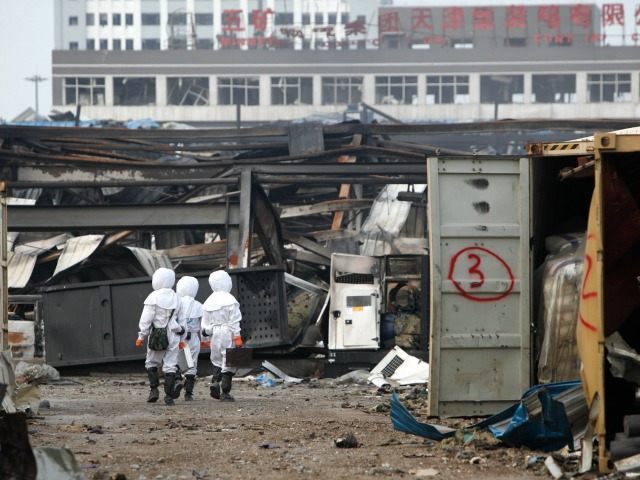Relatives of Chinese disaster victims — from a stampede killing 36 in Shanghai to the capsizing of a ferry carrying hundreds to the Tianjin chemical explosion in August — allege that the government has wiretapped their phones, threatened, and sometimes beaten them to keep them from asking questions.
A Washington Post investigation found many Chinese citizens who have lost family members in disasters throughout the past year who believe they have been monitored and threatened by the Chinese government to prevent attracting curious media to the cases at hand. In particular, the newspaper spoke to relatives of those killed on the Eastern Star, a cruise ship that capsized into the Yangtze River in June and killed hundreds, and the Tianjin explosion in August, caused by illegal chemical storage too close to an urban residential center.
The relatives of people who died in both contend that Chinese officials have been dismissive of their questions regarding how both incidents were allowed to occur, and the more vocal relatives allege they have been threatened into silence.
“All we want to know is the truth, but we have no right to know, and no right to speak,” Candy Tang, who lost a daughter on the ship, tells the Washington Post. “The government just thinks of us as troublemakers now.”
“They tried to prevent us going to the rescue site, and they wouldn’t even let us have a meeting of the victims’ families,” a woman who declined to be identified by the newspaper added. A protest in August ended with police beating and arresting a woman who had lost a family member on the Eastern Star.
Relatives, the Washington Post adds, can only collect compensation if they vow to leave the government alone and not ask questions about the incident in public.
The Chinese government has declined to cite human error as a possible reason for the ship collapse. Its captain, Zhang Shunwen, has not been charged with negligence or investigated, according to Chinese media. While there is evidence that unavoidable bad weather tipped the ship over, other captains navigating the area avoided a similar fate by anchoring their ships, leading relatives to ask why Zhang refused to do so.
In contrast to Chinese government behavior, the government of South Korea acted swiftly against the captain of a ferry whose decisions at the helm resulted in a similar disaster. Captain Lee Joon-seok of the Sewol ferry that sunk in 2014, killing more than 300 people, was sentenced to 36 years in prison for murder. He also faced the death penalty.
Suppression of relatives of Eastern Star victims is nothing new. In June, when the tragedy occurred, Time reported that many relatives claim they were warned not to speak to any media. Others claim they have been physically followed by police officials, and others still report beatings for organizing protests demanding answers.
“I can’t rule out that even among Chinese journalists there are people who want to smear the government,” said Nanjing deputy chief of police Hu Shining at the time of an ordinance forbidding reporters from covering the story. Only state-controlled media outlets like Xinhua, The Global Times, and The People’s Daily reported on the incident, emphasizing the good work of search and rescue teams deployed to the ship.
The Chinese relatives of a disaster of an entirely different scale found themselves with the unusual freedom to protest for much of 2014, however: the families of passengers aboard Malaysia Airlines Flight 370, which disappeared flying from Kuala Lumpur into China. Two-thirds of its passengers were Chinese, and dozens of relatives began to routinely protest outside of the Malaysian embassy in Beijing in the months following its disappearance. With chants of “the Malaysian government are murderers,” the families of victims were allowed to congregate outside the embassy with minimal police interference. Police only intervened when the group of protesters appeared poised to physically attack the embassy, pushing them away from the building, in August 2015. That protest followed the news of a potential find on Reunion Island off the eastern coast of Africa.
Unlike those affected by Eastern Star or the Tianjin incident, however, those who lost loved ones on MH370 did not blame the Chinese government, but the Malaysians, likely posing less of a threat in the eyes of Chinese police. Many of their complaints regarding the investigation run out of Kuala Lumpur directly echoed the Chinese government, which routinely warned Malaysia to work harder to find the plane. “We expect Malaysia to take the leading and coordinating role, come up with a new search plan for the jet at an early date, and take the investigation seriously,” Chinese Premier Li Keqiang said in May 2014, more than a year before the Reunion Island findings.

COMMENTS
Please let us know if you're having issues with commenting.